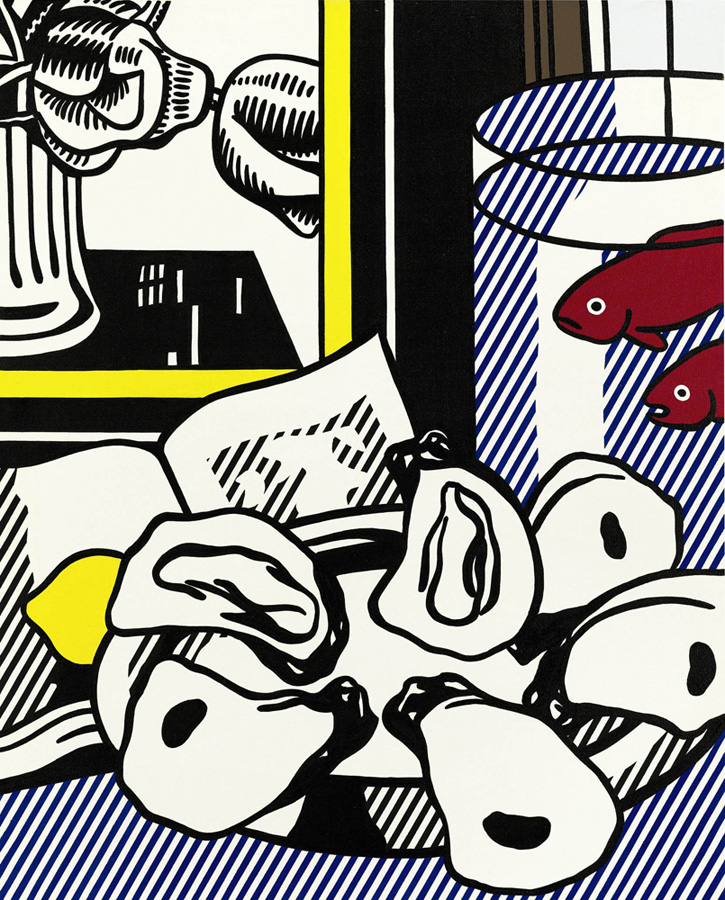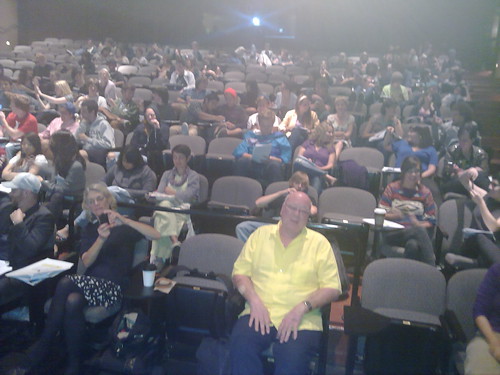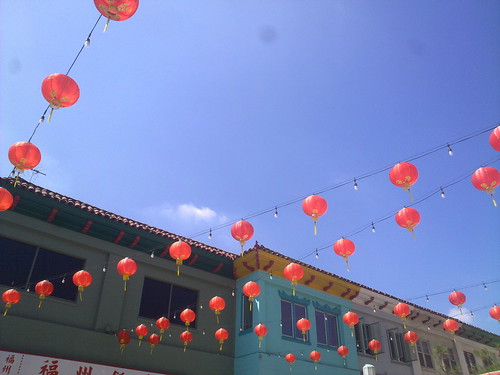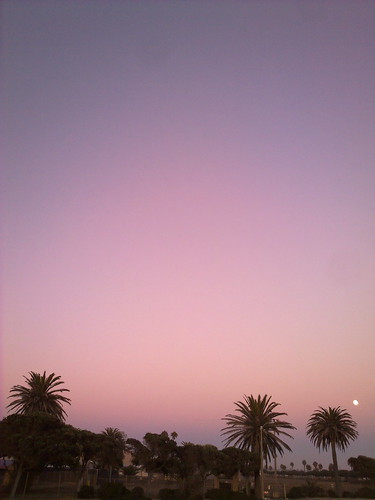So today as part of my Making and Meaning presentation, I had everyone take out their phone and snap a photo of their neighbor on either side. This simple gesture facilitated a commonality – a shared experience outside of the standard lecture context – that made the point that when you feed the network, the network feeds you.
Pete Ippel – Artist / Athlete – hypermodern.net
– Taken at 11:34 AM on September 03, 2010 – uploaded by ShoZu
Red Lanterns Blue Sky Chinatown Los Angeles California
A lovely day is blue sky dotted with red lanterns.
Pete Ippel – Artist / Athlete – hypermodern.net
– Taken at 11:43 AM on August 30, 2010 – uploaded by ShoZu
Finding Beauty In The Strangest Places
Yesterday I was out on my bike taking a little break from the studio and snapped this panorama of some old oil tanks.
Pete Ippel – Artist / Athlete – hypermodern.net
– Taken at 3:58 PM on August 27, 2010 – uploaded by ShoZu
Roy Lichtenstein Is Influenced By Asian Printmakers And Brushwork
And this is my favorite piece of his work, as far as I know after this was auctioned by Sotheby’s it’s out of the public eye. Bummer.

Roy Lichtenstein (1923-97)
Still Life with Oysters, Fish in a Bowl and Book
Executed in 1973
Oil and magna on canvas
132 by 105 cm. (52 by 42 in.)
Estimate ($4,350,000-$5,540,000)
Making History: Free And Open Culture

Making and Meaning – Making History Project
San Francisco Art Institute, Fall, 2010
Workshop Leader: Pete Ippel
Summary: Free and Open Culture refers to a wide variety of advocates who value free access, open information, and the sharing of knowledge. As a rapidly developing movement, Free and Open Culture has its roots in computer programming and hacker ethic from the 1950s-1960s.

Developments include Creative Commons licensing, FLOSS (Free/Libre Open Source Software), Network Neutrality, Open Government, and Copyleft.
Free Culture proponents are marked by acceptance of some general principles: (http://en.wikipedia.org/wiki/Hacker_ethic#The_hacker_ethics)
- Sharing
- Openness
- Decentralization
- Free access to computers
- World Improvement
Cultural Figures: Linus Torvalds (programmer, Linux), Richard Stallman (programmer, GNU), Lawrence Lessig (academic, Creative Commons), Jon Phillips (developer, Sharism, Fabricatorz), Femke Snelting (artist/designer, LGM), Simona Lodi (arts administrator, To Share Festival), Nina Paley (animator, Sita Sings The Blues), Negativeland (music), Ant Farm (art), Adbusters (magazine), The Yes Men (art)
Project: Students will spend the first sessions studying the history and techniques of the Free and Open Culture advocates and artists. There will be tutorials on a variety of software, as well as an off campus outing to practice employing the Hands-On Imperative.
“…essential lessons can be learned about the systems—about the world—from taking things apart, seeing how they work, and using this knowledge to create new and more interesting things.”
– Steven Levy
Students will pursue the following questions:
- What are my artistic assets?
- What is my intellectual property?
- How does copyright apply to me as an artist?
- How does decision making, production, and follow-up inform my practice?
- How can I use goal setting, affirmation, planning to my advantage? (Software versioning)
- What can I learn from business, science, and community?
- Why are concepts of a testable hypothesis and experimental constant important in art?
- How do sunk cost and return on investment apply to my artistic endeavors?
In the remaining sessions, students will be challenged to create with only the materials they have on hand – please bring an open mind and your own PORTABLE creation tools of choice to each session (mobile phone, laptop, sketchbook, notebook, watercolor, pencils, video camera, still camera, etc.).
We will be developing a collaborative community-centric studio (less) art practice out in the environment. The group will create their own art pieces in any media with strong consideration of Free and Open Culture. The end result will be an on-line repository (Mediawiki) documenting the projects. It is expected that the participants in this class will license their work under Creative Commons, and investigate the following issues:
- I create everywhere because I have the network in my pocket.
- If it’s not on the Internet, it doesn’t exist.
- Objects are not important, information is.
- I don’t need to know it if I know how to find it.
- Online, nothing disappears, and everything is gone.
- I feed the network, it feeds me.
Summer Moonrise Ventura County California
Nearly a full noon rising over the palms near Surfer’s Point.
Pete Ippel – Artist / Athlete – hypermodern.net
– Taken at 7:42 PM on August 23, 2010 – uploaded by ShoZu
The Grit and The Grind: Exploring The Artistic Hustle, Commonalities, and Myth
This workshop will explore commonalities among The Bay Area’s innovative, musicians, poets, entrepreneurs, artists, and politicians. Starting with hip-hop as a visible, accessible entry point to the grand metaphor of a creative career path we will canvass our community for inspirational stories, myths, fictions, half-truths, lies, facts, and constructions.

After discussion and research the workshop will focus on answering the following questions by creating projects based on:
- What is my personal creation story?
- What makes me better/different than the next artist?
- What challenges have I overcome to follow my dream?
- How does my lifestyle affect my art, or are they unified?
- How do I get more attention to my art?
By creating persona and personal legends on-line and in the street, we will be exploring how social media (blogs, facebook, twitter, foursquare) can both become a distraction from your art and an attraction to your art. We will even approach social media AS your art.
Please bring an open mind and your own PORTABLE creation tools of choice to each session (mobile phone, laptop, sketchbook, notebook, watercolor, pencils, video camera, still camera, etc.). The take away is learning how you can use the power of presentation to influence viewers, community, and media outlets.



